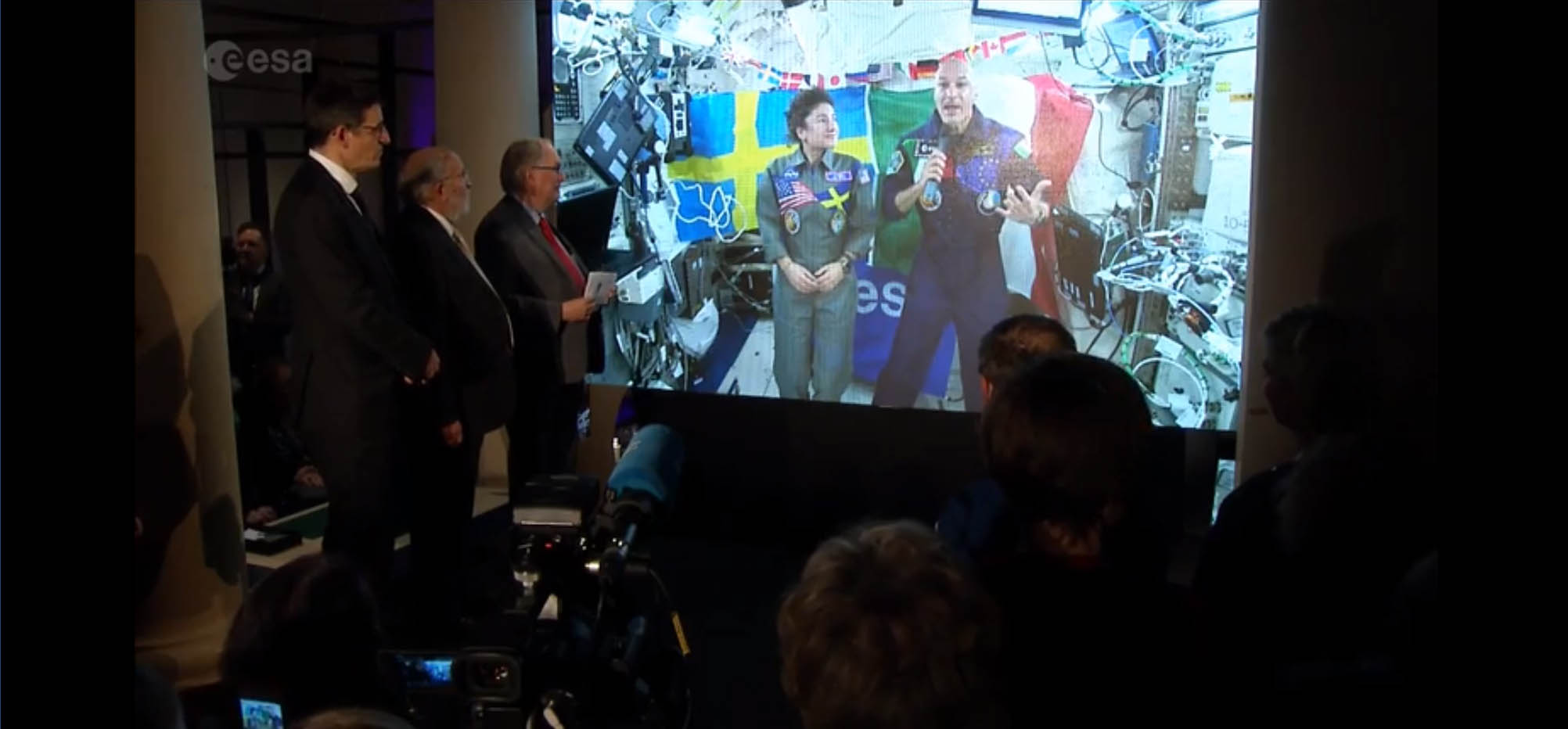Nobel Prize Winners Talk Secrets of the Universe with Astronauts in Space
There was some strong hero worship going on between Earth and space recently.
On the ground in Sweden on Dec. 6, three Nobel Prize laureates gathered to talk about the universe with none other than two Expedition 61 astronauts orbiting roughly 250 miles (400 kilometers) above Earth: NASA's Jessica Meir, and Italy's Luca Parmitano on the International Space Station.
Hot on the list of topics? What alien life would look like and also, how some of the Nobel prize work contributed to life on the space station today.
Swiss astronomer and physicist Didier Queloz, who co-discovered the first exoplanet orbiting a first sun-like star with Michel Mayor (who also attended), told Parmitano he envied the Italian the chance to see "a view of the whole planet, that many of us would love to see."
Related: 2019 Nobel Prize in Physics Mixes 2 Research Fields — And Politics

He asked how much the view from space inspires the search for exoplanets. Parmitano suggested that to humans, there is one perspective because it is home. But to an alien visitor, "I would desire nothing else but to land and enjoy the sights from up close."
Queloz's question to Meir, a biologist by training, was a little harder – it concerned how possible it would be to detect life on exoplanets, and what kind of life forms she would envision. Meir said the key to thinking about life is to think outside the box and try to imagine life other than our own, carbon-based life and think about different elements that could be useful to extraterrestrials.
Get the Space.com Newsletter
Breaking space news, the latest updates on rocket launches, skywatching events and more!
Meir said that scientists should remember when hydrothermal vents were first discovered under the ocean in the 1970s, along with microbes that harness the chemical energy to not only survive, but thrive. "Until that time, people had this traditional view that life, of course, was always based on harnessing life from the sun or some equivalent star."
The astronauts and Nobel laureates also bantered about life chemistry and physical limits to life before turning away from secrets of the universe, to focus on the secrets of batteries.
Another of the participating scientists was Stanley Whittingham, who won the Nobel Prize in chemistry for his work in creating lithium-ion batteries. Funny enough, just a few months ago, astronauts on the station were replacing old nickel-hydrogen batteries on ISS with more efficient lithium-ion ones.
"We thank you very much for your contribution to the International Space Station," Meir said to Wittingham, pointing out the many advantages of the new batteries. They are supposed to last 10 years, instead of the 6.5-year rating of the previous generation. Moreover, one lithium ion battery can generate enough energy to replace two of the older nickel-hydrogen ones. Since less mass is always something to strive for in space, Meir said that efficiency is a great help to space explorers.
Wittingham asked how the astronauts protect the batteries against extremes in the space environment, and Parmitano explained how a combination of solar heating and cold ammonia lines stabilize the batteries through extreme heating and cooling as they orbit the Earth.
Mayor, the other Nobel laureate in physics, asked Parmitano about inspiration, the last large theme of their short chat. Parmitano urged students to stay curious, and "question everything, because "up here, we really love getting answers and finding answers to questions … but I think that every time we find an answer, there are 10 more questions that rise up."
Parmitano closed the chat with a challenge to the Nobel laureates: would they trade the chance to go in space for their new honor? Whittingham, who is pushing 80 years old, said "If I was younger, yes." Mayor said he wasn't sure. And it was Queloz who got the biggest laugh. "Yes, I would, because nothing prevents an astronaut from getting another prize."
- The Strangest Alien Planets in Pictures
- Extremely Hot and Incredibly Close: How Hot Jupiters Defy Theory
- 10 Exoplanets That Could Host Alien Life
Follow Elizabeth Howell on Twitter @howellspace. Follow us on Twitter @Spacedotcom and on Facebook.

Join our Space Forums to keep talking space on the latest missions, night sky and more! And if you have a news tip, correction or comment, let us know at: community@space.com.

Elizabeth Howell (she/her), Ph.D., was a staff writer in the spaceflight channel between 2022 and 2024 specializing in Canadian space news. She was contributing writer for Space.com for 10 years from 2012 to 2024. Elizabeth's reporting includes multiple exclusives with the White House, leading world coverage about a lost-and-found space tomato on the International Space Station, witnessing five human spaceflight launches on two continents, flying parabolic, working inside a spacesuit, and participating in a simulated Mars mission. Her latest book, "Why Am I Taller?" (ECW Press, 2022) is co-written with astronaut Dave Williams.









